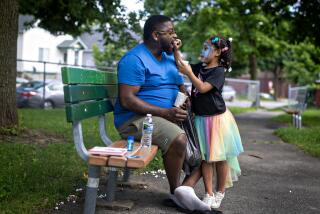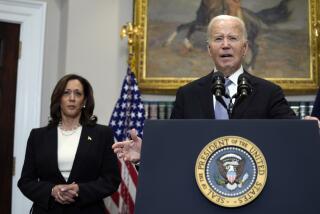As Joe Biden woos Iowa voters, Pete Buttigieg seems increasingly to be in his way

COUNCIL BLUFFS, Iowa — Jeanne Trachta was a strong Joe Biden supporter during his 2008 presidential campaign, serving as a precinct captain. A dozen years later, she still likes the 77-year-old former vice president, but as she waited for his event here to begin, she gushed about a candidate less than half Biden’s age.
“He’s so articulate and charismatic and intelligent,” Trachta said of Mayor Pete Buttigieg of South Bend, Ind., whom she had seen here just a few days earlier. “He’s so organized. I’m getting something from the Buttigieg campaign a couple times a day.”
Trachta personifies a challenge facing Biden in Iowa and elsewhere as he tries to regain traction with the argument that he is the experienced, tested candidate best able to beat President Trump.
Among centrist voters inclined to like Biden, the 37-year-old Buttigieg is becoming plausible as an alternative, and he highlights what Biden is not: energetic, articulate and young.
“I’ve narrowed it to Joe and Pete,” said Ed Neddermeyer, a farmer in Schleswig, Iowa. “Joe comes from a tried-and-true administration. Pete has a fresh face. I like what he’s saying and how he is saying it. When he first came out, there is no way I’d say that.”
These are difficult days for the Biden campaign. Although he has maintained his lead in national polls, Biden plummeted to a third-place tie last month in the Des Moines Register/CNN poll of Iowa while Buttigieg leapt into first. Those results, along with other polls showing Biden doing poorly in New Hampshire, which holds the other first contest of the primary season, set off renewed alarms about the former vice president’s prospects.
Biden’s team has suggested for weeks that it does not consider the Feb. 3 Iowa Democratic caucuses a must-win: His strength among African American voters, in particular, will help him in contests that are later on the primary calendar, they say. Even if that’s true, however, an embarrassingly poor showing here could hobble him.
To avoid that, Biden is trying to do what he’s always done best — retail politics. On Saturday, he began an eight-day bus tour through Iowa, the longest stretch he has spent in the state, testing the stamina and discipline of a gaffe-prone candidate.
Even as he tries to make his mark, however, he can’t escape comparisons with Buttigieg, who traveled through much of the same territory just before Thanksgiving.
The two compete for similar voters — the kind of Democrats who favor political and economic change, but not as drastic a change as proposed by Sens. Elizabeth Warren of Massachusetts and Bernie Sanders of Vermont. But if the prescriptions are similar, they come in very different packages.
Trachta saw Buttigieg at a raucous rally in Council Bluffs where an estimated 2,100 people showed up. She said the crowd was much more enthusiastic than the roughly 200 who came to Biden’s event in the same city — perhaps, she said, because Biden’s event was held outdoors on a grim, blustery afternoon.
“Joe is definitely still in the running,” she said of her caucus choices. “I am just holding out to see who I think the most electable candidate will be.”
In a brief interview, when asked about his problems here, Biden noted that his rivals have been in the state more than he has.
“You have to show up,” he said, leaning over to whisper in a reporter’s ear.
He spoke with more bravado earlier, when he told reporters in a coffee shop: “I’m running to win. I’m not running to lose. I’m not running to come in third or fourth or fifth or anything like that.”
He demurred when asked about Buttigieg.
“Anything I say about Pete will be taken as maybe criticism or a negative about Pete, and I don’t have any negative feelings about Pete at all. I think he’s a talented guy,” Biden said.
But he did take a veiled swipe by adding: “I think the American people and people of Iowa are looking for somebody who doesn’t need a whole lot of on-the-job training.”
As he spoke, Biden was having breakfast with former Iowa Gov. Tom Vilsack and his wife, Christie — popular Democratic political figures who recently endorsed Biden and joined him on the bus tour. Their pitches for his candidacy, often more succinct than Biden’s, turned a laser focus on beating Trump.
“Think about more than whom you like, or who best aligns with your political thinking,” Christie Vilsack told voters in Denison.
“I hope you’ll think about the people who won’t or can’t participate in the caucuses, but who will vote in the general election. I hope you’ll think about the people in the middle, because those are the people who will decide the 2020 election.”
The former governor also spoke affectingly about how Biden — who still mourns the 2015 death of his son Beau — had comforted the Vilsacks’ son on the death of his daughter last year.
In an interview, Vilsack said he believed Iowa voters were still sizing up candidates with the casual but intensifying interest of shoppers paging through gift catalogs weeks before Christmas. Voters now are focusing on the eye-catching candidates, but will eventually get more practical and go with Biden, he predicted.
Others are more skeptical. In Dubuque County, in eastern Iowa, Democratic Party Chairman Steven Drahozal said he thought undecided voters were more likely to break for other candidates because Biden is already so well-known.
“I have not heard from any undecided caucus-goers that they are looking at Biden now,” said Drahozal, who is neutral in the race. “The people I know who are supporting him supported him before he announced and after he announced.”
Biden dubbed his bus trip the “No Malarkey” tour, saying that the name made clear that his principal target would be Trump.
“The reason we named it ‘No Malarkey’ is the other guy is all lies, so we just want to make sure there’s a contrast,” Biden said.
The name also provided a marker for the sort of voters he’s attracting — those old enough to know what “malarkey” means.
They tended, at least in the trip’s initial days, to be very low-key in their enthusiasm. While trying to kill time at the outset of a Biden event on a university campus in Storm Lake, Iowa, a volunteer tried to rev up the crowd with an Obama-inspired chant.
“Fired up? Ready to go!” the volunteer shouted. But the chant petered out after four rounds.
The typical Biden event included a short stump speech — less than 10 minutes at the kickoff rally that Trachta watched. Biden still had his trademark tendency to ramble. But the setting played more to his strengths as a conversational, relaxed speaker than do the tightly structured, high-pressure candidate debates where he has often stammered and struggled to squeeze his long-winded, Senate-honed style into quick responses.
His Iowa events initially allowed no question-and-answer period, a format that limited his exposure to potential missteps, but left some voters disgruntled.
“People were anxious to visit and ask him questions,” said Jean Ulmer, a retiree from Soldier, Iowa.
What the events did provide was time for Biden to spend on a rope line, talking to voters one-on-one, showcasing his personal skills and a special compassion for people who, like him, have suffered tragic losses. In addition to his son Beau’s death to cancer, Biden lost his first wife and a young daughter in a 1972 car crash.
In Denison, Pat Swanson told Biden she was a breast cancer survivor and talked about Beau, a conversation that ended with both teary-eyed.
“I told him when he threw his hat in the ring, I threw my hat in for him,” said Swanson, who had Biden autograph her sweatshirt arm with a Sharpie.
In Council Bluffs, Bobby Larson and his sister told Biden that their 86-year-old grandmother was a huge fan but unable to attend the rally. Biden had them call her.
“I hope my grandkids talk as well about me as they talk about you,” he told her.
Pat Menegay, a retired teacher, was won over, as well. She had seen Buttigieg in Denison recently and was impressed by his intelligence, calm demeanor and practical approach. Although she had supported Biden in his two previous presidential bids, Menegay came to the Denison campaign event unsure she’d commit a third time.
But after the event, she was sold. “He was remarkable,” she said. “ He calmed me. He assured me. He reminded me of what the world used to be like.”
Such moments, however, don’t sway everyone.
Sarah Small, a chef from Fort Dodge, got Biden to call her sister when her turn on the rope line came. She was in the market for a second-choice candidate because her favorite — Sen. Kamala Harris of California — is faltering.
Despite the call, Biden didn’t make the sale.
“Biden speaks to a segment of the party that is white and over 59,” said Small, who is 28, and white, but is dating an African American man. “His plans don’t speak to me,” she said.
More to Read
Get the L.A. Times Politics newsletter
Deeply reported insights into legislation, politics and policy from Sacramento, Washington and beyond. In your inbox three times per week.
You may occasionally receive promotional content from the Los Angeles Times.











